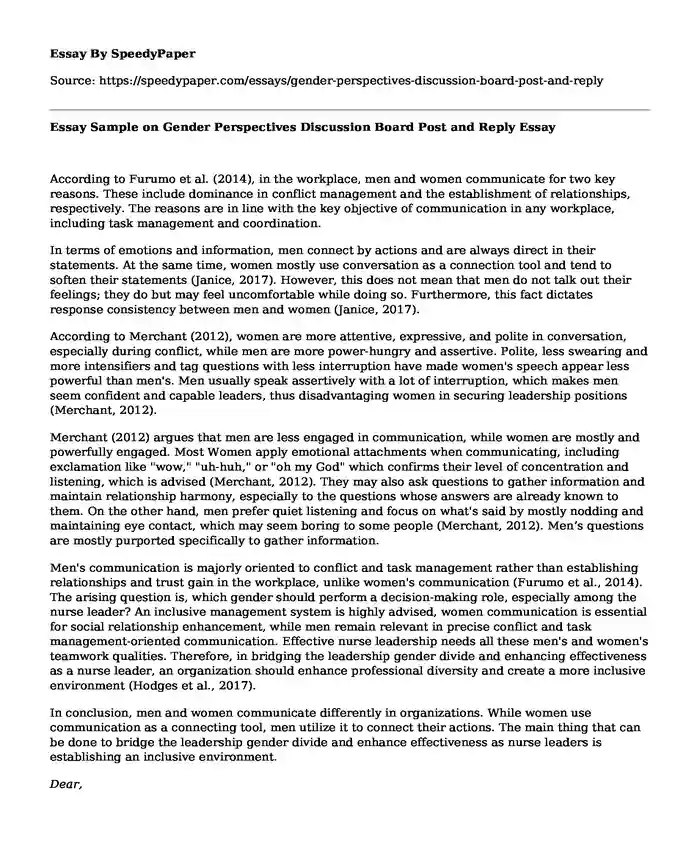
| Essay type: | Compare and contrast |
| Categories: | Gender Culture Human resources Interpersonal communication |
| Pages: | 4 |
| Wordcount: | 861 words |
According to Furumo et al. (2014), in the workplace, men and women communicate for two key reasons. These include dominance in conflict management and the establishment of relationships, respectively. The reasons are in line with the key objective of communication in any workplace, including task management and coordination.
In terms of emotions and information, men connect by actions and are always direct in their statements. At the same time, women mostly use conversation as a connection tool and tend to soften their statements (Janice, 2017). However, this does not mean that men do not talk out their feelings; they do but may feel uncomfortable while doing so. Furthermore, this fact dictates response consistency between men and women (Janice, 2017).
According to Merchant (2012), women are more attentive, expressive, and polite in conversation, especially during conflict, while men are more power-hungry and assertive. Polite, less swearing and more intensifiers and tag questions with less interruption have made women's speech appear less powerful than men's. Men usually speak assertively with a lot of interruption, which makes men seem confident and capable leaders, thus disadvantaging women in securing leadership positions (Merchant, 2012).
Merchant (2012) argues that men are less engaged in communication, while women are mostly and powerfully engaged. Most Women apply emotional attachments when communicating, including exclamation like "wow," "uh-huh," or "oh my God" which confirms their level of concentration and listening, which is advised (Merchant, 2012). They may also ask questions to gather information and maintain relationship harmony, especially to the questions whose answers are already known to them. On the other hand, men prefer quiet listening and focus on what's said by mostly nodding and maintaining eye contact, which may seem boring to some people (Merchant, 2012). Men’s questions are mostly purported specifically to gather information.
Men's communication is majorly oriented to conflict and task management rather than establishing relationships and trust gain in the workplace, unlike women's communication (Furumo et al., 2014). The arising question is, which gender should perform a decision-making role, especially among the nurse leader? An inclusive management system is highly advised, women communication is essential for social relationship enhancement, while men remain relevant in precise conflict and task management-oriented communication. Effective nurse leadership needs all these men's and women's teamwork qualities. Therefore, in bridging the leadership gender divide and enhancing effectiveness as a nurse leader, an organization should enhance professional diversity and create a more inclusive environment (Hodges et al., 2017).
In conclusion, men and women communicate differently in organizations. While women use communication as a connecting tool, men utilize it to connect their actions. The main thing that can be done to bridge the leadership gender divide and enhance effectiveness as nurse leaders is establishing an inclusive environment.
Dear,
I agree with you on the fact that personality affects communication skills more than gender. According to Leonard et al. (2009), culture affects personality, thereby ruling out that culture and communication are inseparable and culture includes values, beliefs, and customs. Leonard et al. (2009) also observed that culture greatly affects communication; thus, all organizations need to take this advantage to create an organizational culture that will encourage better communication skills for better organizational performance. It can be done by coming up with shared principles, beliefs, values, and practices to balance the masculine culture of assertiveness, interruptive and competitive communication with the feminine nature of nurturance, relationship establishment, and trust gain speeches.
Although I agree with your point, gender also affects communication skills greatly. Men may have tedious speech as they tend to use around three tones in speech, while females tend to apply about five tones. As observed by Eunson (2012, p. 16), men tend to use loudness to stress points, while females tend to use pitch and inflection to highlight points. Similarly, Men tend towards rough and staccato delivery, while women tend towards more breathy and flowing delivery. Also, gender affects communication in terms of voice pitch, inflection, tone, emphasis, delivery, aggression, and topic (Eunson, 2012, p.17). According to you, how do you think gender affects communication? Thank you so much for your contribution. It was interesting reading your post.
References
Eunson, B. (2012). Culture and Communication. John Wiley & Sons.
Furumo, K., Buxton, M., de Pillis, E., Higa, K., & Furumo, H. (2014). Differences between male and female communications and conflict management styles in virtual teams. Journal of Management and Marketing Research, 17(1).
http://www.aabri.com/HC2014Manuscripts/HC14018.pdf
Hodges, E. A., Rowsey, P. J., Gray, T. F., Kneipp, S. M., Giscombe, C. W., Foster, B. B., ... & Kowlowitz, V. (2017). Bridging the gender divide: Facilitating the educational path for men in nursing. Journal of Nursing Education, 56(5), 295-299. https://www.researchgate.net/publication/316709369_Bridging_the_Gender_Divide_Facilitating_the_Educational_Path_for_Men_in_Nursing
Janice, C. (2017). Difference between male and female communication in the workplace. https://www.loopline-systems.com/en/blog-en/the-differences-between-male-and-female-communication-style-in-workplace
Leonard, K. M., Van Scotter, J. R., & Pakdil, F. (2009). Culture and communication: Cultural variations and media effectiveness. Administration & Society, 41(7), 850-877. https://www.researchgate.net/publication/48513293_Culture_and_Communication_Cultural_Variations_and_Media_Effectiveness
Merchant, K. (2012). How men and women differ: gender differences in communication styles, influence tactics, and leadership styles. CMC Senior Theses. http://www.aabri.com/HC2014Manuscripts/HC14018.pdf
Cite this page
Essay Sample on Gender Perspectives Discussion Board Post and Reply. (2023, Oct 31). Retrieved from https://speedypaper.com/essays/gender-perspectives-discussion-board-post-and-reply
Request Removal
If you are the original author of this essay and no longer wish to have it published on the SpeedyPaper website, please click below to request its removal:
- Free Essay on Police Response to Domestic Violence
- Essay Example Reviewing PR-Related Articles
- Paper Example - Excellent Leadership Communication
- Essay Example. Einstein Healthcare Network's Internal Medicine Program
- Free Essay Example. Fish Cheeks.
- Color Consciousness in America: Unveiling Complexities, Media Portrayals, and Solutions - Paper Example
- Essay Sample on Cecil Rhodes and Theodore Roosevelt
Popular categories




